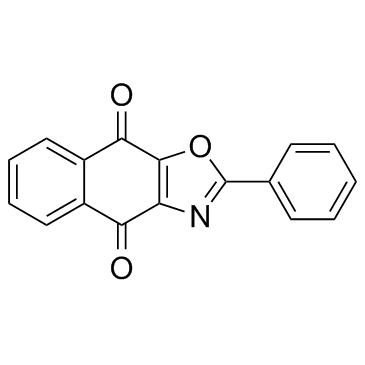63388-44-3
| Name | 2-phenylbenzo[f][1,3]benzoxazole-4,9-dione |
|---|---|
| Synonyms |
4,9-Dihydro-4,9-dioxo-2-phenylnaphtho[2,3-d]oxazole
2-phenyl-naphthoxazole-4,9-quinone 2-Phenyl-naphth<2,3-d>oxazol-4,9-dion 2-phenyl-4,9-dioxo-4,9-dihydro-naphtho[2,3-d]oxazole FD5016 Naphth[2,3-d]oxazole-4,9-dione,2-phenyl 2-phenyl-naphtho[2,3-d]oxazole-4,9-dione SJB2-043 |
| Description | SJB2-043 is an inhibitor of the native USP1/UAF1 complex with IC50 of 544 nM. |
|---|---|
| Related Catalog | |
| Target |
IC50: 544 nM (USP1/UAF1)[1] |
| In Vitro | SJB2-043 causes a dose-dependent decrease in ubiquitin-specific protease 1 (USP1) levels and a concomitant degradation of inhibitor of DNA-binding-1 (ID1) protein in the K562 cells at a micromolar drug concentration. SJB2-043 also causes a decrease in the levels of other ID proteins, namely ID2 and ID3 in K562 cells. SJB2-043 causes a dose-dependent decrease in the number of viable K562 cells, with an EC50 of approximately 1.07 μM. Moreover, SJB2-043 induces apoptosis of K562 cells in a dose-dependent manner[1]. |
| Kinase Assay | The in vitro enzymatic assays are performed using ubiquitin-AMC (Ub-7-amido-4methylcoumarin) as a substrate in a reaction buffer containing 20 mM HEPES-KOH (pH 7.8), 20 mM NaCl, 0.1 mg/mL ovalbumin, 0.5 mM EDTA and 10 mM dithiothreitol. The fluorescence is measured by FluoStar Galaxy Fluorometer. For the Ub-vinylsulfone (VS) assay, the proteins are incubated with Ub-VS at 0.5 μM final concentration for 45 min at 30°C, followed by the immunoblotting analysis[1]. |
| Cell Assay | Leukemic cell lines are grown in RPMI 1640 medium supplemented with 10% fetal bovine serum and penicillin/streptomycin. Hela cells and U2OS cells are grown in DMEM supplemented with 10% fetal bovine serum and penicillin/streptomycin. USP1 inhibitor C527 and its derivatives (e.g., SJB2-043) are synthesized and the purity is validated by high-performance liquid chromatography. Primary human AML patient samples are collected from DFCI leukemia program under the approval of appropriate protocols. Cells are treated with DMSO or USP1 inhibitors (e.g., SJB2-043) in appropriate medium for 24-72 hrs. The viable cell counts are determined using Trypan blue staining, Cell TiterGlo reagent or MTT assay. The apoptotic cells are detected using AnnexinV and 7AAD staining using flow cytometry. For Benzidine staining, the cells are washed twice with PBS and resuspended in 45 μL of PBS + 5 μL of Benzidine stain solution (0.2% in 0.5 M glacial acetic acid, 3% H2O2). After 45 min incubation at room temperature, the Benzidine positive cells are detected by light microscopy[1]. |
| References |
| Density | 1.4±0.1 g/cm3 |
|---|---|
| Boiling Point | 495.0±48.0 °C at 760 mmHg |
| Molecular Formula | C17H9NO3 |
| Molecular Weight | 275.258 |
| Flash Point | 253.2±29.6 °C |
| Exact Mass | 275.058258 |
| PSA | 60.17000 |
| LogP | 4.60 |
| Vapour Pressure | 0.0±1.3 mmHg at 25°C |
| Index of Refraction | 1.656 |
| Storage condition | 2-8℃ |
